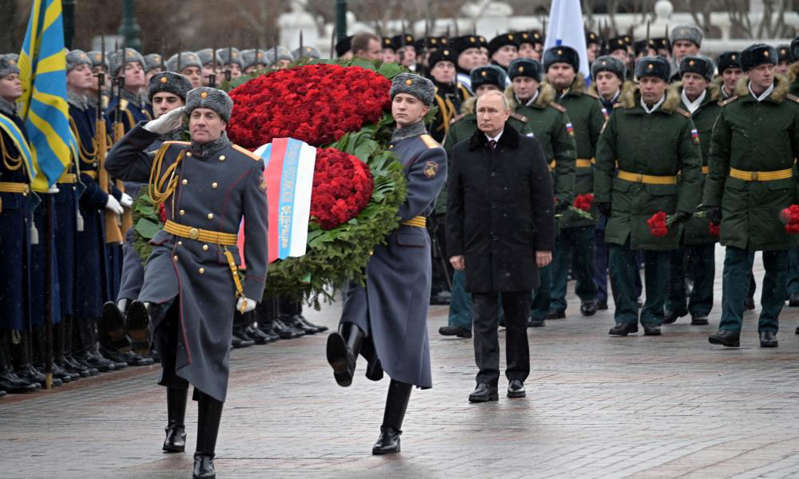Ukraine has advised its estimated 3 million citizens living in Russia to leave the country, in the latest signal that Kyiv believes Moscow may be planning an invasion.
In a statement on Wednesday, the Ukrainian foreign ministry urged its citizens to refrain from travel to Russia and for those already in country to leave as soon as possible.
“Due to the increased Russian aggression against Ukraine, which, among other things, may lead to a significant restriction of the ability to provide consular assistance on the territory of the Russian Federation, the ministry of foreign affairs recommends that Ukrainian citizens refrain from any travel to the Russian Federation, and those who are in this country immediately leave its territory,” the ministry statement said.
It also warned that it would have limited resources to help those Ukrainians who remained in Russia in case of a major diplomatic rupture.
“We emphasise that ignoring their recommendations will significantly complicate ensuring proper protection of Ukrainian citizens in the Russian Federation,” the note read.
Ukrainians make up the largest diaspora community in Russia, where many have family members and travel to work. An estimated 3 million Ukrainian citizens live in Russia, according to a speech Vladimir Putin made in 2019.
Separately, the National Security and Defence Council has asked parliament to impose a state of emergency throughout Ukraine, except for Luhansk and Donetsk oblasts – the regions that include Russian-controlled territories – where one has already been in place for many years.
The council held a long meeting on Tuesday morning, after Russia began moving troops across the border into the separatist-held territories it recognised on Monday, and the US announced that the invasion of Ukraine it had been warning about for weeks had begun.
Alexei Danilov, the secretary of the council told journalists after the meeting that the state of emergency allowed the government to bring in controls including restrictions on movement, and curfews.
However, curfews are not currently expected to be brought in, and would only be imposed in case of increased Russian aggression, he said.
He also confirmed that the country was calling up the first 36,000 military reservists. The country has nearly half a million veterans with frontline experience in the east, so potentially still has a large pool of fighters it could call up.
On Wednesday, Putin delivered a video address to the country in connection with the Defender of the Fatherland Day, a national holiday which recognises members of the military and on which most Russian men receive presents.
In the speech, he praised the battle-readiness of Russia’s military, which has 190,000 soldiers on the borders with Ukraine according to western estimates.
“Our country is always open for direct and honest dialogue, for the search for diplomatic solutions to the most complex problems,” Putin said.
But he added: “The interests of Russia, the security of our citizens, are non-negotiable for us.”
The remarks do little to allay concerns that Russia is preparing itself for a strike against Ukraine. On Tuesday evening, Putin received formal authorisation from the Federation Council to deploy his military abroad and said that he would recognise the land claims of the separatist territories in south-east Ukraine, raising the chances of a war in the near future.
He has called for talks between Kyiv and the Russian-controlled territories, negotiations that Ukraine has always called unacceptable because it views them as Russian proxy states.
And in another worrying sign, Russia has announced that it will evacuate its diplomats from Ukraine to “protect their lives and safety”.
“In the current circumstances, our first priority is to take care of Russian diplomats and employees of the embassy and consulates general,” the foreign ministry said in a statement on Tuesday evening, saying that it was necessary due to rising tensions.
Ukrainian officials have urged western officials to strike hard with sanctions before any Russian attack, believing that would help deter the Kremlin from sending its troops further into Ukraine.
“To stop Putin from further aggression, we call on partners to impose more sanctions on Russia now,” wrote the Ukrainian foreign minister, Dmytro Kuleba.
“First decisive steps were taken yesterday, and we are grateful for them. Now the pressure needs to step up to stop Putin. Hit his economy and cronies. Hit more. Hit hard. Hit now.”
The European Union was expected to approve its sanctions package on Wednesday. The 27-member bloc is approving personal sanctions against top Russian officials.
The Guardian, UK

